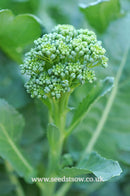Description
This variety was first cultivated by the Romans and was introduced to America in the 1880's. Since then, it has become very popular in western vegetable gardens. It is so popular because it can be grown and picked over a long season, producing many side shoot broccoli spears once the central head has been harvested.
It is disease resistant, hardy and easy to grow, and the quick maturity (50 to 70 days) means that it is also great for succession sowing.
| When to Sow | March to June (or from March to October in a Polytunnel). Early sowings should be made under cover until risk of frost has passed. |
| Where to Sow | Sow the seeds thinly in well prepared seedbeds or modules, 1cm deep in short rows 30cm apart. Sow thinly, reducing the amount of future thinning required and the potential risk from pests. |
| What to do Next | As seedlings emerge, thin out to 5cm apart. When seedlings are 10-15cm tall transplant to growing site spacing plants at least 30cm apart. Water the day before moving and keep well watered. Provide fleece protection until risk of frost has gone in late May. September sown seedlings should be grown on in a cold greenhouse/cold frame and planted out early March. Protect with netting from the cabbage white butterfly. |
| Harvest | June onwards (2- 3 months after sowing - depending when sown). Harvest the heads in tight bud with a sharp knife leaving a small stalk. Harvest regularly as this will encourage side shoots to grow quickly and will extend the cropping period which can be up to 8 weeks. |
| Handy Tips | If seeds have been sown direct and require thinning you can always create extra rows if you are careful with the removed seedlings. Calabrese do not like bare root transplanting therefore make sure you take plenty of soil with the seedlings and plant in a deep drill of 2.5cm deep to give the seedling a good anchorage. Lower crop density (wider spacing) gives a longer period of harvest, as more secondary heads are produced. Plants mature faster in warmer weather and may be quick to bolt therefore ensure well watered and harvested on a regular basis. Consider placing mulch around the base of the plant to keep the roots cool to further prevent the risk of bolting. |
| Companion Planting | Radishes, peas, beets and nasturtiums are all useful companions. |
| Nutritional Information | Excellent source of vitamins C , K and B and low in calories. |
| Serving Suggestion | Calabrese is best steamed rather than boiled as it will retain its flavour and texture better. Small spears can also be stir-fried. The thicker stalks are great for making soups like Broccoli & Stilton Soup. |
Payment & Security
Your payment information is processed securely. We do not store credit card details nor have access to your credit card information.




